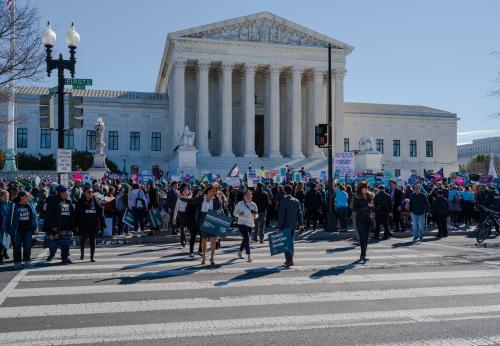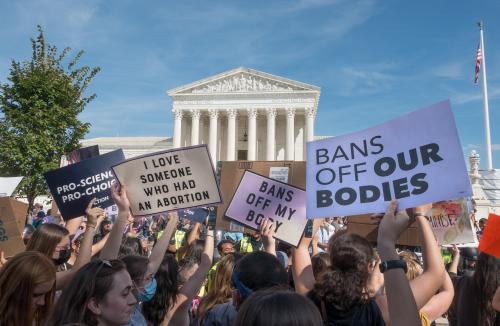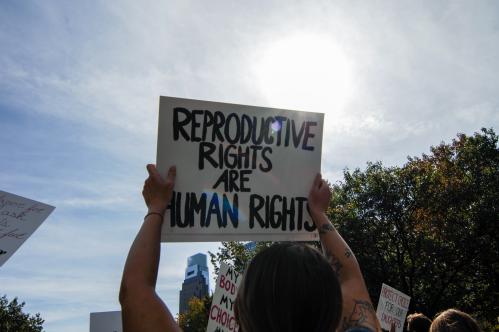In recent days, Iran’s Supreme Leader Ayatollah Ali Khamenei has sparked an intense conversation surrounding the significance of the phrase “heroic flexibility,” which he invoked in a speech before the leadership of Iran’s Revolutionary Guard Corps earlier. Many have interpreted the phrase, which invokes an episode from early Islamic history, as an explicit endorsement of the efforts of Iran’s newly-installed president, Hassan Rouhani, to alter Iran’s approach to the world.
Iran @ Saban will weigh in on that debate shortly. However, for the moment, we want to dwell on Iran’s real heroes — the individuals who have devoted their lives to working for the betterment of Iran and meaningful improvements in the lives of ordinary Iranians. Several of these individuals were released from prison this week, in what appears to be a goodwill gesture aimed at improving Iran’s image in the international arena on the eve of President Rouhani’s first-ever trip to the United States to participate in the United Nations General Assembly meetings next week.
Among those freed was Nasrin Sotoudeh, a prominent human rights lawyer whose advocacy on behalf of a range of journalists, activists, and dissidents earned her a six-year prison sentence. Sotoudeh is finally free, but her life has been forever altered by her imprisonment, which separated her from her young family. Her courage and conviction won her international attention, including the Sakharov Prize.
Sotoudeh is only the latest in what is a long and distinguished line of Iranian women who have borne unimaginable sacrifices on behalf of their efforts to advance respect and protection for basic rights within Iran. One of her most notable predecessors is Mehrangiz Kar, whom we were fortunate enough to count as a colleague here at Brookings in 2009-2010. Like Nasrin Sotoudeh, Mehrangiz is also a lawyer, and her work on behalf of Iranian children and women first came into national and international prominence during the 1990s. At the time, she was considered one of the leading proponents of women’s rights in Iran, alongside Shirin Ebadi, who would eventually go on to be awarded the Nobel Peace Prize for her work. During this time, she also wrote for the ground-breaking reformist journal, Zanan (Women). In April 2000, just as Iran’s reform movement reached its apex, Mehrangiz was arrested after attending a conference in Berlin alongside a number of other prominent Iranian writers and dissidents, charged with acting against Iran’s national security.
Mehrangiz was released the following year after she was diagnosed with cancer, but no sooner had she left the country to pursue treatment than the regime arrested her husband, renowned journalist Siamak Pourzand. In the subsequent years, Mehrangiz managed to publish widely and continue her advocacy work even as she raised two extraordinary children and continued to devote herself to working for her husband’s release. Like Nasrin Sotoudeh and many others, Mehrangiz has made enormous contributions to Iranians and all those who care about Iran, and she has endured tremendous costs as a result of her work on behalf of legal reform. Tragically, Siamak Pourzand died in 2011 after enduring a decade of imprisonment, abuse and separation from his family. Recently they have established a foundation in his honor, the Siamak Pourzand Foundation, which is carrying on his lifelong work to promote cultural expression.
Mehrangiz was kind enough to grant us an interview, which was featured as part of our recently-released Brookings Essay on Iran, and in another clip from that discussion attached below she discusses her career and how her advocacy work on behalf of Iran’s most vulnerable populations resulted in her arrest and subsequent exile.
It is heartening to see the early signs of a thaw between Washington and Tehran, and I hope that the Supreme Leader’s words about “heroic flexibility” indeed prove true, particularly on the policy issues of greatest concern to Iranians and to the international community. Today’s Washington Post oped by President Rouhani endorses “constructive interaction” and appeals to Washington “to muster the courage to start conveying what we want …and to back it up with the political will to take necessary action.”
But Rouhani should muster the courage and political will to recognize Iran’s real heroes: they are the women who fight in courtrooms to free dissidents and defend children’s right to a safe home; they are the journalists who have exposed the regime’s abuses and inveighed against repression; they are the activists who came to the streets after the 2009 reelection “victory” of Mahmoud Ahmadinejad and demanded that their votes be counted; they are the ordinary Iranians who find ways to interact on the same social media — banned and filtered by Tehran — that Rouhani and his cabinet ministers have used to such advantage. Many are still imprisoned in Iran. Many others, like Mehrangiz Kar, have suffered immeasurably, and yet they remain tireless advocates on behalf of their country and its true interests in securing a better life for its citizens. If Khamenei and Rouhani are truly committed to a new era for Iran, they should recognize the heroes who have paved the way for such a future.
ic<
/p>



Commentary
If Iran’s Supreme Leader Wants “Heroic Flexibility,” He Should Meet Iran’s Real Heroes
September 20, 2013